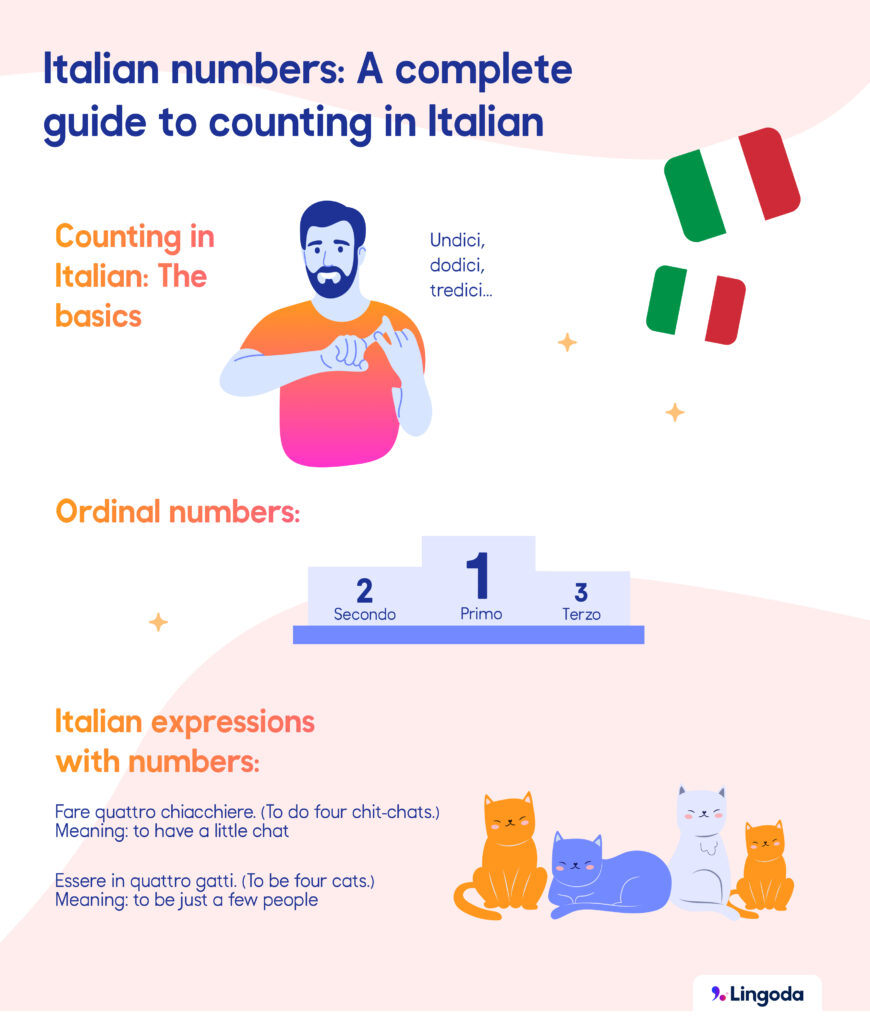Updated on January 14, 2025

Italian numbers: A complete guide to counting in Italian

Did you miss your class on Italian numbers? Time to catch up! Whether you’re ordering coffee, catching a train, or negotiating prices at a local market, knowing how to count and use numbers in Italian is essential.
In this article, we’ll dive into Italian numbers, from basic digits to the dates, prices and idiomatic expressions in which numbers appear on a daily basis. We’ll also point out some patterns, pronunciation tips and practical examples that will help you develop a more intuitive understanding of Italian numbers.

Learn Italian with Lingoda
How it works

Counting in Italian: The basics
Numbers 1 to 10
Italian and Spanish numbers share Latin roots, so if you’ve already learned the basic numbers (1–10) in Spanish, you’ll be glad to know they’re nearly identical in Italian. Some English numbers also derive from Latin, so you shouldn’t have trouble remembering the Italian numbers tre (three), sei (six) and nove (nine), among others.
| English | Italian | Pronunciation |
| one | uno | oo-noh |
| two | due | doo-eh |
| three | tre | treh |
| four | quattro | kwah-troh |
| five | cinque | cheen-kweh |
| six | sei | say-ee |
| seven | sette | set-teh |
| eight | otto | oht-toh |
| nine | nove | noh-veh |
| ten | dieci | dyay-chee |
- Ho una mela. (I have one apple.)
- Ci sono cinque libri sul tavolo. (There are five books on the table.)
- La lezione dura dieci minuti. (The lesson lasts ten minutes.)
Numbers 11 to 20
Numbers 11–16 combine a unique prefix with the suffix –dici, derived from dieci (ten). For numbers 17–19, the order flips; these numbers combine the prefix dici– with a unique suffix.
| English | Italian | Pronunciation |
| eleven | undici | oon-dee-chee |
| twelve | dodici | doh-dee-chee |
| thirteen | tredici | treh-dee-chee |
| fourteen | quattordici | kwa-tor-dee-chee |
| fifteen | quindici | kween-dee-chee |
| sixteen | sedici | seh-dee-chee |
| seventeen | diciassette | dee-chah-set-teh |
| eighteen | diciotto | dee-chot-toh |
| nineteen | dicianove | dee-chah-noh-veh |
| twenty | venti | ven-tee |
- Ho undici mele. (I have eleven apples.)
- Ci sono quindici studenti. (There are fifteen students.)
- Venti persone sono qui. (Twenty people are here.)
Counting beyond the basics
Numbers 21 to 100
Numbers 21–99 are formed by combining the appropriate tenth decimal prefix (venti, trenta, etc.) with the appropriate unit (uno, due, etc.). Notice that the final vowel of the prefix is dropped before uno and otto for smoother pronunciation, so instead of saying ventiuno or ventiotto, we would say ventuno and ventotto.
| English | Italian | Pronunciation |
| twenty-one | ventuno | ven-too-noh |
| thirty | trenta | tren-tah |
| thirty-two | trentadue | tren-tah-doo-eh |
| forty | quaranta | kwa-rahn-tah |
| forty-three | quarantatré | kwa-rahn-tah-treh |
| fifty | cinquanta | cheen-kwan-tah |
| fifty-four | cinquantaquattro | cheen-kwan-tah-kwah-troh |
| sixty | sessanta | ses-sahn-tah |
| sixty-five | sessantacinque | ses-sahn-tah-cheen-kweh |
| seventy | settanta | set-tahn-tah |
| seventy-six | settantasei | set-tahn-tah-say-ee |
| eighty | ottanta | oht-tahn-tah |
| eighty-seven | ottantasette | oht-tahn-tah-set-teh |
| ninety | novanta | noh-vahn-tah |
| ninety-eight | novantotto | noh-vahn-toht-toh |
| one hundred | cento | chen-toh |
- Ho ventiquattro anni. (I am twenty-four years old.)
- Abbiamo ventinove mele. (We have twenty-nine apples.)
- Ci sono trentacinque persone in fila. (There are thirty-five people in line.)
- Ci sono sessantadue posti disponibili. (There are sixty-two seats available.)
- Ho letto sessantotto pagine oggi. (I read sixty-eight pages today.)
- Abbiamo settantadue biscotti per la festa. (We have seventy-two cookies for the party.)
- Il libro ha settantanove capitoli. (The book has seventy-nine chapters.)
- Ci sono ottantuno studenti nella scuola. (There are eighty-one students in the school.)
Hundreds, thousands, and beyond
| English | Italian | Pronunciation |
| one hundred eighty-three | centottantatré | chen-toh-tan-tah-treh |
| two hundred | duecento | dweh-chen-toh |
| two hundred fifty-eight | duecentocinquantotto | dweh-chen-toh-cheen-kwan-toht-toh |
| three hundred | trecento | treh-chen-toh |
| three hundred twenty-six | trecentoventisei | treh-chen-toh-ven-tee-say |
| four hundred | quattrocento | kwah-troh-chen-toh |
| four hundred twelve | quattrocentododici | kwah-troh-chen-toh-doh-dee-chee |
| five hundred | cinquecento | cheen-kwe-chen-toh |
| five hundred two | cinquecentodue | cheen-kwe-chen-toh-doo-eh |
| six hundred | seicento | say-chen-toh |
| six hundred ninety-one | seicentonovantuno | say-chen-toh-noh-van-too-noh |
| seven hundred | settecento | set-teh-chen-toh |
| seven hundred twenty-eight | settecentoventotto | set-teh-chen-toh-noh-ven-toht-toh |
| eight hundred | ottocento | oht-toh-chen-toh |
| eight hundred ten | ottocentodieci | oht-toh-chen-toh-dee-eh-chee |
| nine hundred | novecento | noh-veh-chen-toh |
| nine hundred forty | novecentoquaranta | noh-veh-chen-toh-kwah-rahn-tah |
| one thousand | mille | mee-leh |
| two thousand | duemila | doo-eh-mee-lah |
| ten thousand | diecimila | dyeh-chee-mee-lah |
| one hundred thousand | centomila | chen-to-mee-lah |
| one million | un milione | oon mee-lyoh-neh |
| two million | due milioni | doo-eh mee-lyoh-nee |
| one billion | un miliardo | oon mee-lyar-doh |

Ordinal numbers in the Italian language
Ordinal numbers indicate positions in a sequence (first, second, third, etc.). You can use them to clarify rankings, dates, floors in buildings, and chapters or lessons. Keep in mind that ordinal numbers must agree in gender and number with the noun they modify.
| English | Italian | Pronunciation |
| first | primo/a | pree-moh/mah |
| second | secondo/a | seh-kon-doh/dah |
| third | terzo/a | ter-tsoh/tsah |
| fourth | quarto/a | kwar-toh/tah |
| fifth | quinto/a | keen-toh/tah |
| sixth | sesto/a | ses-toh/tah |
| seventh | settimo/a | set-tee-moh/mah |
| eighth | ottavo/a | ot-tah-voh/vah |
| ninth | nono/a | noh-noh/nah |
| tenth | decimo/a | deh-chee-moh/mah |
- Oggi è il primo giorno di scuola. (Today is the first day of school.)
- Sono arrivato al secondo piano. (I arrived on the second floor.)
- Il terzo capitolo è il mio preferito. (The third chapter is my favorite.)
- Questa è la quarta volta che lo faccio. (This is the fourth time I’ve done it.)
- Hanno festeggiato il loro decimo anniversario. (They celebrated their tenth anniversary.)
Using Italian numbers in daily life
Time and dates
| English | Italian |
| one o’clock | l’una |
| two o’clock | le due |
| noon | mezzogiorno |
| midnight | mezzanotte |
| quarter past three | le tre e un quarto |
| half past four | le quattro e mezza |
| today | oggi |
| tomorrow | domani |
| yesterday | ieri |
| first week of the month | la prima settimana del mese |
| May the 1st | il primo di maggio |
- Che ore sono? È l’una. (What time is it? It’s one o’clock.)
- Incontriamoci a mezzogiorno. (Let’s meet at noon.)
- Il primo di maggio è la Festa dei lavoratori. (The First of May is Workers’ Day.)
- Ieri era una giornata speciale. (Yesterday was a special day.)
- Il treno parte a mezzanotte. (The train leaves at midnight.)
Shopping and prices
| English | Italian |
| price | il prezzo |
| one euro | un euro |
| ten euros | dieci euro |
| 50 cents | cinquanta centesimi |
| 300 grams | tre etti (un etto = 100g) |
| 150 grams | un etto e mezzo |
| discount | lo sconto |
| sale | i saldi |
| receipt | lo scontrino |
| a kilo | un chilo |
| a dozen | una dozzina |
- Qual è il prezzo? (What’s the price?)
- Vorrei un chilo di mele. (I’d like a kilo of apples.)
- Il totale è dieci euro. (The total is ten euros.)
- Avete saldi su questi prodotti? (Do you have sales on these products?)
- Può darmi lo scontrino, per favore? (Can you give me the receipt, please?)
Telephone numbers and addresses
| English | Italian |
| phone number | il numero di telefono |
| area code | il prefisso |
| address | l’indirizzo |
| floor | il piano |
| house number | il numero civico |
| zip code | il codice postale |
- Qual è il tuo numero di telefono? (What’s your phone number?)
- Il prefisso per Roma è 06. (The area code for Rome is 06.)
- Abito al numero civico 10. (I live at house number 10.)
- Qual è il tuo indirizzo? (What’s your address?)
- L’ufficio è al quinto piano. (The office is on the fifth floor.)
Italian expressions with numbers
Numbers frequently appear in Italian idiomatic expressions, proverbs and sayings, often carrying symbolic or cultural significance.
- Essere al settimo cielo. (To be in seventh heaven.)
- Meaning: o be extremely happy or ecstatic
- Fare quattro chiacchiere. (To do four chit-chats.)
Meaning: to have a little chat - Essere in quattro gatti. (To be four cats.)
- Meaning: to be just a few people
- Non c’è due senza tre. (There’s no two without three.)
- Meaning: If something has happened twice, it’s likely to happen a third time.
- Su due piedi. (On two feet.)
- Meaning: Off the top of my head. To explain something without too much preparation.
- Chi fa da sé fa per tre. (One who does it for oneself, does it as if they were three.)
- Meaning: You’re better off doing it by yourself rather than waiting for someone else.
FAQs
What are the numbers 1 to 20 in Italian?
Uno, due, tre, quattro, cinque, sei, sette, otto, nove, dieci, undici, dodici, tredici, quattordici, quindici, sedici, diciassette, diciotto, diciannove, venti.
For 21, 31 and further numbers, combine the tenth decimal prefix with the unit (venti + uno = ventuno). Drop the final vowel of the prefix (venti, trenta) before uno and otto (ventotto).
What are some tips for learning Italian numbers quickly?
Our top three tips are: practice counting aloud, notice the patterns (dici for 11–19 or -anta for 30+) and use real-life examples like prices or dates to reinforce learning.
Learn your numbers in Italian in ‘quattro e quattr’otto!’
From telling time to shopping, from sharing addresses to making plans, numbers in Italian are present constantly.
Want to learn Italian in a supportive environment? Lingoda’s small group classes, flexible scheduling and native-level teachers provide the perfect space to refine your Italian skills. Whether you’re counting to ten or learning idiomatic phrases, you can count on us for an effective learning journey!

Learn Italian with Lingoda
How it works














